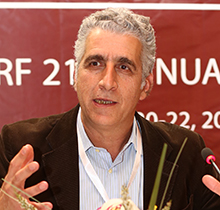Covid-19, trust and rising economic challenges in the Arab world
There is a common view that managing Covid-19 is all about making a trade-off between lives and livelihoods. But as this column explains, comparing global performance, countries have tended to do well, or not, on both health and economics simultaneously. A key correlate of successful country performance is a high level of trust in government, which makes compliance with public health and social measures more efficient – and therefore minimises economic casualty.
Lebanon’s dysfunctional political economy
Using the prospect of a flood of refugees as a bargaining chip in international negotiations, the government is happy to subsist on foreign exchange reserves while waiting to collect geopolitical rents. Yet as this Project Syndicate column argues, there is reason to hope that this strategy, which has already impoverished half the population, will fail.
Killer lockdowns
Most developed countries have responded to the Covid-19 crisis by imposing lockdowns to control the spread of infections rather than taking the ‘herd immunity’ approach that some have advocated. This column argues that poor countries should not necessarily mimic this response: for them, the risks of the herd immunity approach can be dwarfed by the risks of starvation, destitution, instability and violence arising from a prolonged lockdown.
Lebanon’s economic crisis: how to avoid a ‘lost decade’
An independent group of development specialists, economists and finance experts met in Beirut in late December to discuss Lebanon’s economic crisis and the way forward. This column summarises their ten-point action plan to arrest the crisis and place the country on a path of sustained recovery.
Cronyism reduces job creation in Lebanon
Firm-level political connections are widespread. This column examines whether they affect employment decisions in Lebanon, a country where the majority of university students think that connections are important for finding jobs and many admit to having used them.
Lebanon’s perfect storm
After years of maintaining a dysfunctional political economy based on sectarianism and rentierism, Lebanon's ruling elites are being confronted with simultaneous financial, economic and political crises. As this Project Syndicate column argues, the question now is how they respond to a reformist movement demanding fundamental change, including a new political settlement.
Low social and political returns to education in the Arab world
Arab societies urgently need to start looking at how to improve education systems, not just in ways to improve the marketability of individuals but, as importantly, to improve their social and political impact on society. Drawing on evidence from the World Values Survey, this column argues for strengthening a sense of community, beefing up values of civic engagement, inculcating democratic principles, supporting gender equality and promoting social tolerance.


